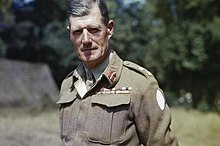John Crocker
Sir John Tredinnick Crocker , GCB , KBE , DSO , MC ( January 4, 1896 - March 9, 1963 ) was a general in the British Army and commanding a corps during World War II .
First World War
At the outbreak of World War I , Crocker enrolled as a private soldier with the Artists' Rifles (a training unit for officers) before becoming an officer in the Machine Gun Corps (MGC). He quickly made a career and was awarded the Distinguished Service Medal and Military Cross with the 174th Machine Gun Company of the 59th (Staffordshire) Division in France.
Between the wars
After the armistice, Crocker left the army to become a lawyer. He didn't like his new job and decided to return to the army. After a short period as an infantry officer in the Middlesex Regiment , Crocker specialized in the then new field of armored warfare and joined the Royal Tank Corps in 1923 . He held a number of troop and staff service positions, including serving as Chief of Staff ( Brigade Major ) of Percy Hobart and GSO1 of Alan Brooke when he was in command of the Mobile Division . At the outbreak of World War II, he was GSO1 in Southern Command .
Second World War
In April 1940 he was appointed commander of the 3rd Armored Brigade within the British 1st Armored Division in France. Crocker's brigade, like most of the British Expeditionary Force (BEF), was largely destroyed in the Battle of France in 1940 . When the remnants of the BEF were evacuated to England in Operation Dynamo after the Battle of Dunkirk , the 1st Panzer Division landed again in the port of Cherbourg and unsuccessfully attacked the German bridgeheads over the Somme . Then she withdrew to Cherbourg, from where the remaining troops, including the last 13 remaining tanks, were evacuated.
Back in England, Crocker was given command of the newly formed 6th Armored Division in September 1940 , then the XI Corps in East Anglia in March 1942 and the IX Corps in September 1942 .
In 1943 he was again sent 'overseas', this time to Tunisia , in order to strengthen the First Army with his corps in the Tunisian campaign . Here he was injured in a training accident and did not personally experience the final battle for Tunis. After his recovery, in August 1943, he was given command of the I Corps within Miles Dempsey's 2nd Army , which was preparing for Operation Overlord .
On D-Day , Crocker had a bigger job than any other corps commander: he had to coordinate two landing beaches ( Juno Beach and Sword Beach ) and the air landing of the 6th Airborne Division ( Operation Tonga ). The fact that the landing went relatively well is considered Crocker's credit.
Caen did not fall as planned on D-Day (June 6, 1944); there was a bloody two-month battle for Caen , in which Crocker's corps was involved in Operation Charnwood , among other things . The 1st Corps was subordinated to the 1st Canadian Army under Henry Crerar in August 1944 . It moved towards the Seine and took part in the less glamorous 'clean-up' along the French and later the Belgian coast. At the end of the World War (May 8, 1945) the corps stood on the banks of the Oude Maas in South Holland opposite the German 25th Army .
The fact that Crocker did not play an important role in the last months of the war was not because Montgomery had lost confidence in him. Rather, it is attributed to the fact that his only son (Wilfrid Crocker), a tank officer in the 5th Royal Inniskilling Dragoon Guards , died in fighting in Holland on October 20, 1944.
post war period
In 1945 Crocker became Commander in Chief of Southern Command and in 1947 of the Middle East Land Forces . In 1950 his career peaked when he was appointed Adjutant-General to the Forces . Montgomery had recommended him the previous year as his successor as Chief of the Imperial General Staff, but Prime Minister Clement Attlee had chosen the better-known William Slim for the post. Crocker's most important achievement in the post-war period was the formulation of the training regulations that laid down the tank doctrine of the British Army during the Cold War .
After his retirement in 1953, he became Vice Chairman of the Imperial War Graves Commission and Lord Lieutenant of Middlesex .
literature
- Biographical Dictionary of British Generals of the Second World War , Nick Smart. ISBN 1-84415-049-6 .
- Crusade in Europe , Dwight D. Eisenhower . ISBN 0-8018-5668-X
- D-Day 1944 , Ken Ford. ISBN 1-84176-368-3 .
- Douglas Delany: A Quiet Man of Influence: General Sir John Crocker . In: Journal of the Society for Army Historical Research . 85, Autumn 2007, pp. 185-207.
Individual evidence
- ↑ Army Commands ( Memento of the original from July 5, 2015 in the Internet Archive ) Info: The archive link was inserted automatically and has not yet been checked. Please check the original and archive link according to the instructions and then remove this notice. (PDF; 964 kB)
- ↑ Delany, p. 203
- ^ A b Documents Relating to New Zealand's Participation in the Second World War 1939–45
- ↑ Delany pp. 204f.
| personal data | |
|---|---|
| SURNAME | Crocker, John |
| ALTERNATIVE NAMES | Crocker, Sir John Tredinnick (full name) |
| BRIEF DESCRIPTION | British Army General |
| DATE OF BIRTH | 4th January 1896 |
| DATE OF DEATH | March 9, 1963 |
